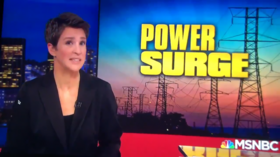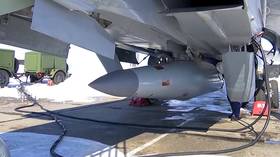'Stop Trump's insane actions!' Venezuela's Maduro talks to RT about avoiding war
At a time when the eyes of the world are closely watching his country, Venezuelan President Nicolas Maduro has given an exclusive interview to RT Spanish, speaking about the threats of war and of foul play in politics.
Several EU nations have been the latest to recognize Venezuelan opposition leader Juan Guaidó as the country's "interim leader," and US President Donald Trump is keeping the military option on the table against the "illegitimate" Maduro, while aiming to choke Venezuela's oil trade with sanctions.
Amidst the turmoil, Maduro firmly believes he has the backing of the people – and says he doesn't care how history will remember him, as long as it's not as a traitor.
"There's one thing I know for sure: I will not be remembered as a traitor, as a weak man who reneged on his historical commitments and betrayed his nation," he told RT Spanish.
Guaidó's recognition a 'political and moral mistake'
The nations that have recognized Juan Guaidó as Venezuela's 'acting president' have made a "diplomatic, political and moral" mistake, Maduro believes.
In the 21st century, international relations cannot be built on ultimatums.
He pointed to the European governments and those of the US-backed Lima Group (which includes Argentina, Brazil, Mexico and Canada, among others) as being subservient to Washington's policies in seeking to force a "coup, a comedy, a circus" upon Venezuela.
No lack of elections in Venezuela
When asked if he would be ready to declare early presidential elections to appease those questioning his legitimacy, Maduro staunchly refused.
"There's no deficit of elections in Venezuela, we held elections 25 times in the last 20 years," he said. "We had six elections in the past year-and-a-half."
The only elections pending, Maduro said, are parliamentary ones in 2020, in accordance with the constitutional schedule.
Preparing for war: US losses must be unaffordable
While US President Donald Trump has not ruled out military intervention in Venezuela, Maduro appears to believe it's not going to happen – but says his armies are still getting ready.
"There will be no war or military intervention," Maduro said. "But that doesn't mean we must not prepare to defend our sacred land." To that end, Venezuela is preparing two million fighters, as well as missile systems, artillery, air force and fleet.
We need to ensure that a military intervention would cost the US entirely too much in terms of military spending and human lives.
However, as the more present threat he sees Trump's "illegal" and "amoral" threats – which Maduro says he is countering by using all the media available to spread "truth" and "peaceful diplomacy," and call on world leaders to stop "Donald Trump's insane actions against Venezuela."
Washington's 'casus belli'
Venezuela is not a threat to the US, and the real reasons to threaten an invasion are far more cynical, Maduro believes.
"What 'casus belli' does Donald Trump have against Venezuela? Have we got weapons of mass destruction? Are we a threat to the US? You know what the real 'casus belli' is here? Venezuelan oil. Venezuela's riches – gold, gas, diamonds, iron, water."
Also on rt.com Maduro: Oil, gold & other riches behind Trump’s Venezuela crusadeThe Venezuelan president is also convinced the Bolivarian revolution itself is a target, in a crusade against socialism in which Washington wants to destroy the "fruits of the revolution, which has become an example of independence, of social justice."
Ready for dialogue, but Guaidó is just a pawn
Asked whether for the sake of resolving Venezuela's internal strife he would be ready to negotiate with Guaidó, and whether that would mean acknowledging his legitimacy, Maduro said he is ready to talk – but not with Guaidó.
"I believe that Juan Guaidó is a random pawn, used by the opposition for an opportunistic scenario that will never play out," he said. Maduro says he has called for dialogue "more than 300 times," but he wants to talk to the real leaders of the Venezuelan opposition, who are "more significant" than Guaidó.
Humanitarian aid is a form of intervention
Maduro, who has so far refused to allow humanitarian aid Juan Guaidó is expected to receive from Colombia and Brazil, believes it to be a "political show."
Imperialism helps no-one in the world. No-one. Tell me where in the world have they sent humanitarian aid? All they send is bombs. Bombs that have destroyed Afghanistan, Iraq, Libya, Syria.
Maduro claims that his country, which is in a catastrophic economic crisis exacerbated by American sanctions, is fully capable of providing for its people, by producing and importing anything it needs. As an example, he named the so-called CLAP program, which is currently providing six million Venezuelan families with food.
Those who leave are no better off
Numerous Venezuelans have left the country to escape economic hardship, but Maduro says the numbers are exaggerated. While official data is lacking, the UN has estimated that over five million will have fled by the end of 2019.
If that were true, Venezuela, a country with only about 31 million inhabitants, would have "ghost cities," Maduro said, while praising his country's ability to accommodate immigrants: over five million Colombians, over 300,000 each of Ecuadoreans, Peruvians, Spaniards and Portuguese, as well as over a million Arabs, currently live in Venezuela, according to the president.
The country also runs a "homecoming" program, which has so far seen over 12,000 Venezuelans return home.
A lot of Venezuelans left hoping to find a better life, but they only found xenophobia, persecution, exploitation.
Harsher US sanctions won't stop Venezuela from selling oil
While slamming a new wave of US sanctions, which aim to shut Venezuelan oil sales out of American financial systems, Maduro said they still won't be enough to starve the country into submission.
Also on rt.com Venezuelan oil exports plunge on ‘harsher’ US sanctions"We do not depend on this source of revenue," Maduro said. "The whole world should know this, since freezing these assets was portrayed as a major achievement."
The sanctions will still complicate things, though: now, buyers will have to pay in cash at the Venezuelan oil port before tankers set out. Still, Maduro believes this won't impair his country's ability to tap into new oil markets, including China and India. The increased transport expenses will be offset by a boost in oil production: Maduro plans to increase it from the current 1.5mn barrels-per-day to 2.5mn barrels-per-day by mid-year, in order to ensure Venezuela's economic independence and set it on the road to recovery.
Think your friends would be interested? Share this story!















